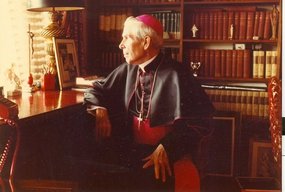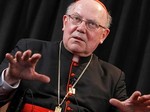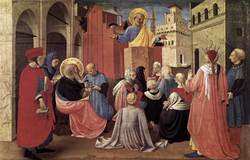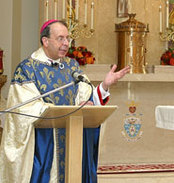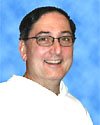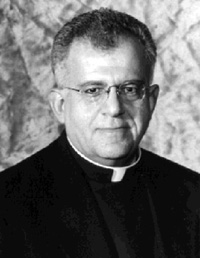A running fight between a priest and his religious superior over how direct the priest can be in his preaching that Jesus is The Way, The Truth and The Life has been ensuing for an extended period of time. The dialogue between the two is not edifying. The superior is arguing that the priest is teaching his own brand of Catholicism that is offending some of the faculty and some of the parents. The priest is preaching and teaching what Church believes, and is articulated in the Second Vatican Council and other documents like Dominus Iesus. The latter contends that the fruits of V2 have too often generated poorly catechized adults and has contributed to a general weakening of the truth of salvation. Jesus Christ has been reduced to moralisms or what beige Catholicism shows, “the nice Jesus.” Reading the homilies you do realize that the priest is not pouring vinegar in the eyes of the congregants but he is being clear in his teaching: the gospel is true, and the magisterium of the Catholic Church is accurate –salvation is at hand. His point: Do you believe in what is biblically revealed by God? Or, is theology made up as you go along to get along? If it is the latter, then we are in deep trouble.
Catholics can’t be the only ones dealing with matters of doctrine and dogma. Sure enough, the Wall Street Journal answered my question. No, Catholics, the Orthodox and other ecclesial communities are having to face the problems of what is being preached, and what face of Jesus Christ is being revealed today to the world. The secularists are not the only ones to “change” the face of Jesus. The content of a priest’s preaching is as much important as the how something is said. Words matter; concepts matter, clear thinking is crucial. Yet, style cannot be confused with content.
In the “Houses of Worship” column in WSJ today Stephen Prothero writes about a Seattle Evangelical Pastor Mark Driscoll and his efforts to portray a more robust understanding of who Jesus Christ is, an image that does not make Jesus out to be a “pansy.” Driscoll evidently believes that many quarters of Christianity have distorted the Christology to fit contemporary concerns. Prothero characterizes Pastor Driscoll as believing “too many American churches are populated by ‘chicks’ and a bunch of nice, tender chickified church boys.” In other words, what Driscoll sees in Christian churches today is a face of Jesus that is cosmetically altered to fit a current ideology, one that is not too challenging, one that has little-to-no-concern for ultimate things. Dare I say, the current Jesus is anemic.
I think it is fair to say that Jesus Christ we ought to preach, the Second Person of the Trinity, is not made in the image and likeness of certain men and women. He is the image of Someone greater, the Divine Mystery.
What else does Driscoll think and say? Apparently, his assessment indicates that some Christians have swapped out the revealed Son of God for “a limp-wrist hippie in a dress with a lot of product in his hair.” Jesus is metrosexual. Sounds similar to the controversy noted above. Prothero notes that some segments of American Christianity, since the 1800s, have preached a “Jesus as a brave warrior –not a meek preacher….” It is thought that if the image and person preached –Jesus– was more masculine men would be coming back to the practice of religion, or we would be more faithful to what is biblically revealed. I am not sure that has to be an agenda item; but I am concerned that the truth be preached and not glossed-over to suit a constituency.
I happen to think that the person of Jesus we often warm up too is inconsistent with what is foretold in the prophecies of the OT, and in the portrait given in the NT. Sacred Scripture does not give us an effeminate savior. Quite the contrary, Jesus of the NT is not aiming to be a “nice God-man interested in how you’re feeling.” We don’t have a Savior who is a good social worker. Salvation is not the liberation of personal anxieties but the liberation from sin and death; it is the opening the possibility of encountering the Beatific vision. Think of Jesus’ interaction with tax collectors, the pharisees, the mis-guided apostles and so on, ought to give us an indication of the person of Jesus: being “nice,” that is, sentimental, is not going to get you to heaven.
Prothero quotes Billy Sunday who said in 1916: “Lord save us from off-handed, flabby-cheeked, brittle-boned, weak-kneed, think-skinned, pliable, plastic, spineless, effeminate, sissified, three-carat Christianity.” A strong, masculine Jesus was transformed in the 60’s and 70’s with “Jesus Christ Superstar” and “Godspell.” You know, I think Billy Sunday is right.
Stephen Prothero is uneasy with and dismissive of, Pastor Driscoll and Sunday, because he lacks a Catholic understanding of Scripture, liturgy, and theology. Prothero, likes suburban Catholicism with a pretty low Christology. It seems to me that he sees the person of Jesus as relative and subjective. And is inconsistent with what is witnessed by the saints. Rather unfortunately, Prothero doesn’t hold to the existence of objective reality, objective truth. A reading of the person of Jesus in Scripture and orthodox biblical exegesis shows a face of Jesus concerned more with the true “ends” of man and woman rather than being given a make-over to suit post-modern problems in psychology. Nowadays, according to some, you just have fit-in if you are going to be an acceptable preacher of the Gospel of Jesus Christ.
